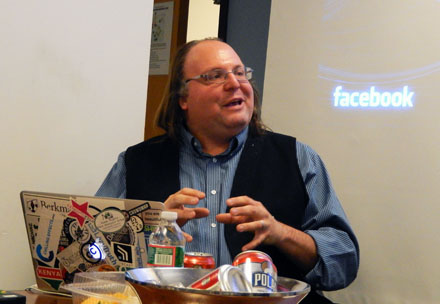
October 29, 2013 – How can we increase our cognitive diversity through social networks that thrive on familiarity? To look more closely at answers and possible solutions, the Shorenstein Center invited Ethan Zuckerman, director of the Center for Civic Media at MIT and principal research scientist at the MIT Media Lab, to share his insights.
Zuckerman’s new book, Rewire: Digital Cosmopolitans in the Age of Connection, examines this important need for “cognitive diversity” – connecting with people and communities who are different than one’s peer group. Of the millions of people on Facebook, Zuckerman said, most people are connected to people they already know. “Facebook replicates offline dynamics…and friendships tend to be highly local,” he said. Only a very small percentage of Facebook users are connected to people across international borders. “Why does this matter?” he asked, “Because we’re getting less news about the world.” In the past 20 years, he said, the amount of international news that Americans receive has dropped considerably.
What this Facebook data shows, Zuckerman suggested, is that “there is a very strong social tendency toward homophily – toward ‘birds of a feather flock together.’” So far, the Internet “seems to only emphasize this tendency, rather than challenge it.”
Tracing the patterns of how people interact with media and news sources, Zuckerman pointed out that what started with a curation model, where prominent news organizations like The New York Times presented users with information about the world “whether you think you need it or not,” was replaced with the search model, which brought personalized news and enabled users to “get exactly what they want, but not what they might need to know about the world.” Where we are now is the social model, he said, where large social networks filter news “through the eyes of your friends.” The result is that these networks “put you in a box.” The motivation behind the networks doing this isn’t that they’re evil, Zuckerman argued, but that “it’s a really good way to make money,” because there’s no effort made toward civic responsibility, only to selling ads.
To combat this tendency toward an echo chamber online, Zuckerman suggested projects like Global Voices which “tries to open up what’s going on in social media to a global audience.” Tools like Weekly Different look at who you follow on social media and suggest different kinds of people, thus increasing your cognitive diversity online. These are first steps, he concluded, to “rewire your way toward an Internet that actually prepares you to live in a global and connected world.”
Article and photo by Janell Sims, Shorenstein Center.

